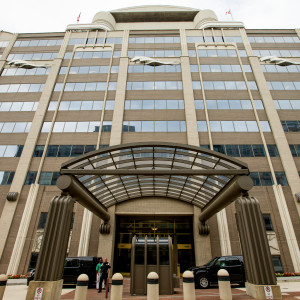Law enforcement may soon get access to blocked caller IDs thanks to a Federal Communications Commission plan advanced Thursday aimed at unmasking anonymous callers who threaten schools, churches, and other institutions.
Commissioners voted unanimously to advance a plan that will give law enforcement streamlined access to caller ID information from telephone and internet providers in cases of threats. Telecommunications operators are barred from giving out such information under existing FCC rules.
The proposal comes after the FCC, at the request of New York Democrat and Senate Minority Leader Chuck Schumer, granted law enforcement a temporary waiver to those rules in March to unmask callers who made anonymous threats to Jewish Community Centers in New York, New Jersey, Pennsylvania, Delaware, Indiana, Alabama, Missouri, North Carolina, and Florida. The number of threatening calls ticked up shortly after the inauguration of President Donald Trump.
After months of investigating at least five waves of such calls, “law enforcement officers were unable to identify the callers partly because of one of our rules,” FCC Chairman Ajit Pai said during the agency’s open meeting Thursday.
“That rule requires carriers to honor a customer’s request that his or her telephone number not be transmitted or otherwise revealed to the party called, which prevents third parties, including law enforcement, from figuring out who’s calling,” Pai said.
Under the plan, law enforcement won’t have to apply for a waiver from the FCC on a case-by-case basis to request the unmasking of blocked caller IDs.
“The proposal lays out a path that protects consumer privacy by ensuring that caller information only be disclosed for truly threatening calls and that only law enforcement personnel and others responsible for the safety and security of the threatened party have access to otherwise-protected caller ID information,” the FCC said in a statement.
Calls deemed threatening by the FCC would include those with the potential for “serious and imminent unlawful action posing a substantial risk to property, life, safety, or health.”
The temporary waiver for Jewish Community Centers will remain in place while the FCC hears public comment on the plan and drafts a final proposal for adoption.
In other efforts aimed at assisting law enforcement, commissioners advanced a plan to broadcast threats to law enforcement over the nationwide Emergency Alert System. The plan comes in response to numerous targeted attacks against police in recent months.
Authorities could use such “Blue Alerts” to notify the public through TV and radio of threats to police and provide information on how to assist in apprehending suspects.
“Blue Alerts can be used to warn the public when there is actionable information related to a law enforcement officer who is missing, seriously injured or killed in the line of duty, or when there is an imminent credible threat to an officer,” the agency said.
In another public safety item the FCC adopted standards for building a nationwide network for emergency first responders, portions of which will be built by states to integrate with a core network allowing responders to communicate seamlessly during crises.
The First Responder Network Authority (FirstNet) requires the integrated radio network be built in all states, but allows states to build their own portion instead of the federal government. Thursday’s order set down the rules for how states must build those networks if they opt-out of the federal plan.
Another vote gave OneWeb permission to build a network of 720 low-Earth orbit satellites that could provide high-speed internet to rural and underserved areas as soon as 2019. The network was the first of its kind to seek permission from the FCC, which must ensure it doesn’t interfere with other services that transmit over the same airwaves.
“Today’s action paves the way for OneWeb to provide broadband services using satellite technology that holds unique promise to expand Internet access in remote and rural areas across the country,” the agency said in a statement. “This approval is the first of its kind for a new generation of large, non-geostationary-satellite orbit (NGSO), fixed-satellite service (FSS) systems.”
The last items on Thursday’s agenda included fining a Florida man a record $120 million for making almost 100 million spoofed robocalls, proposing to eliminate reporting requirements for payphone operators, and seeking comment on whether state/local regulations and internet provider practices are impeding broadband competition in multiple tenant environments.
“We support the Commission’s interest in ending exclusive wiring arrangements between multiple tenant environments, like condos and apartments, and broadband providers,” Phillip Berenbroick, policy counsel at the consumer advocacy group Public Knowledge, said. “These agreements keep competition out of local neighborhoods, limiting consumer choice for broadband services just because a building owner has cut a deal with the incumbent provider.”
Subscribe for the Latest From InsideSources Every Morning

